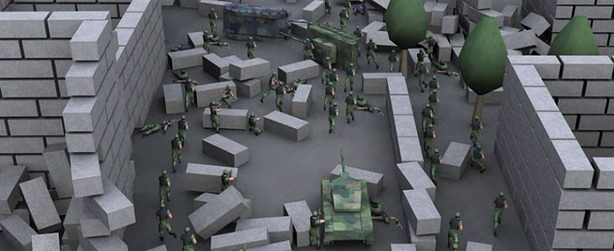Games are getting clever?
TS: So where does Artificial Intelligence fit into all of this? I mean, I've seen a few great body simulations from Natural Motion that look to use physics – does AI fit under the same umbrella?RT: Like physics, AI isn't just one thing either. There are three broad areas of AI – there's AI behaviours, AI path finding and AI event branching. I've just given you those in their order of difficulty to do.
So the first one, AI behaviours, is relatively simple to do and lets be clear that AI is incredibly, horribly computationally difficult so relatively needs to be taken in context. Right now in most games we have ragdoll physics, where you either shoot and kill the bad guy or you miss – you never just wound him. You can't shove someone in today's games; you can't graze someone when you shoot them in the arm; you can't injure someone's legs or feet to slow them down, never mind blowing limbs off so the characters limp around.
TS: I'd love to see someone recreate the Omaha Beach scene from Saving Private Ryan with physics, gore and realistic graphics. It'd have the potential to be a very moving scene in a game like Call of Duty. Obviously, it wouldn't be for everyone, but if you wanted to experience it (the shock, horror and human struggle), you could...
RT: I think that's possible with the technology that's coming from Natural Motion. What's more, the interesting thing about the software that Natural Motion has, is that once it's been applied and you've seen a game with it, it's really hard to play any game without it again. It just doesn't look right.

If Backbreaker doesn't change sports games forever, it'll definitely change the way we think about ragdoll physics forever. Click to enlarge.
TS: Yeah, when I saw Backbreaker for the first time, I was blown away. And when I went back to gaming at home, ragdoll physics just looked horrendous and it makes me wonder why I ever thought that looked even remotely real.
RT: I think Backbreaker is going to revolutionalise sports games. There is no question and I have no doubt about it. The great thing is that Natural Motion will make its technology available to all developers as a middleware solution. But it's important to note that there are two parts to Natural Motion's business, because they're not just developing middleware.
You see, there's Natural Motion the middleware developer and Natural Motion the games studio.
On the middleware side of the business, Natural Motion has Morpheme and Euphoria. Morpheme is the like the light version of its technology in that it doesn’t use dynamic motion synthesis it's still however an advanced animation engine and powerful graphical authoring tool-chain, while Euphoria has the full dynamic motion synthesis. And then on the studio side, they're making Backbreaker and a few other titles as well which I cant talk about without permission.
So that's AI behaviours, which is literally how bodies behave and react to external or physical forces.
TS: So what about the other two, AI path finding and AI event branching?

A cool demo from AI Seek that shows how characters react to changes to the environment.
RT: Well next, there's AI path finding. And there are two or three companies working in that area, including Kynogon, AI Seek and others. Physics and AI are both inherently parallel problems to solve, if that makes sense, and anything that's parallel can be done faster on the GPU than on the CPU.
Finally, there's AI event branching and whilst its already in play today its fairly simple. To get sophisticated advanced AI event branching, well many developers don't think this problem will be solved for quite some time. Some have said at least five to ten years before we have the horsepower to do the calculations for revolutionary event branching that would for example allow you to make deep moral, outcome orientated dynamic goal changing and outcomes/endings. What if we could design games where there was no single pre-defined ending? Now there’s a future challenge!
TS: That's where something happens and that changes what happens in the future...
RT: Yep, exactly – it's hugely complex and it's going to take a while before we can calculate what's required. Don't think about calculating how people react to explosions here, I'm thinking about something way beyond that – I help this guy, so his friend is nice to me and this other guy didn't like the guy that was nice to me, so he killed him and then tried to kill me as well... and then it goes on and on. The degree and depth to which you implement it is just immensely complex.
It's going to take a while.
TS: And just thinking about it makes me wonder how much compute power it's going to require. I get the feeling it's somewhere north of "a lot."
RT: Yes it is, that's for sure.

MSI MPG Velox 100R Chassis Review
October 14 2021 | 15:04










Want to comment? Please log in.